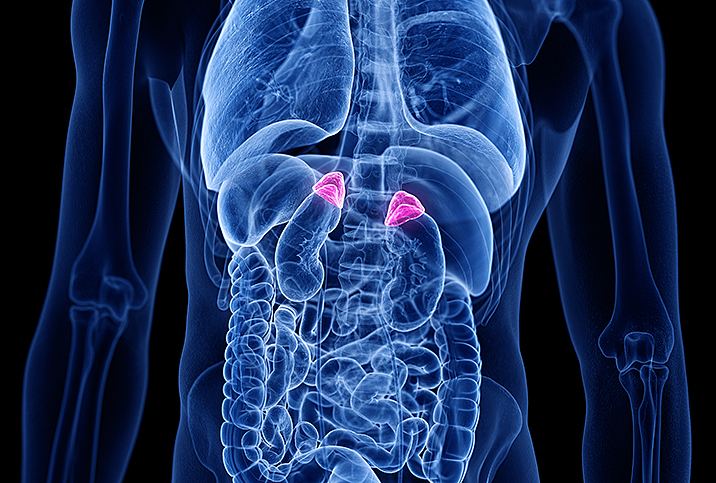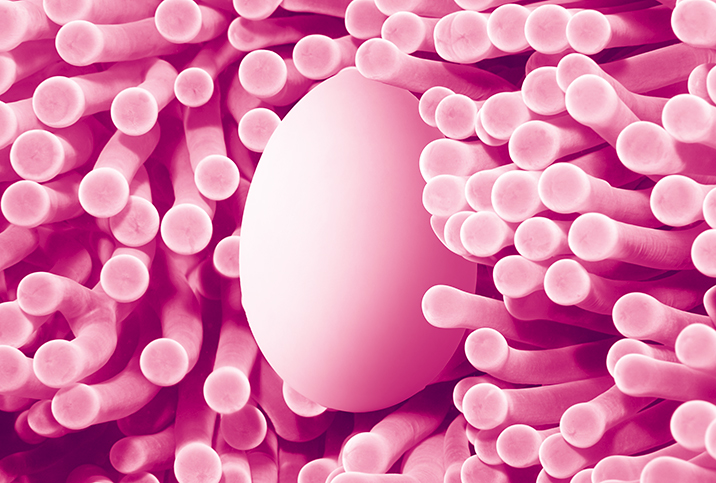Understanding the Impact of Cushing's Syndrome on Fertility

A hump between the shoulders? An excess of stretch marks? You may be suffering from Cushing's syndrome—a condition in which the body makes too much of the hormone cortisol. Named after the American neurosurgeon Harvey Cushing, who discovered the condition in 1912, Cushing's syndrome is also sometimes referred to as hypercortisolism.
So, what is cortisol? This hormone is produced by the adrenal glands, two small yet essential producers that live just above each of our kidneys. Cortisol is often considered the "alarm system" within your body, working with the part of the brain that controls mood, motivation and fear. An excess of cortisol can lead to a host of symptoms, derailing some of the body's most important functions—including fertility.
Who is affected by Cushing's syndrome?
According to the American Association of Neurological Surgeons (AANS), around 70 percent of sufferers are women. Patients are mostly ages 20 to 50, which covers much of the child-bearing years.
It is not known exactly why Cushing's is more common in women. However, according to Lora Shahine, M.D., a physician at Pacific Northwest Fertility in Seattle and podcaster at Baby or Bust, there is a hypothesis. "Many hormone-producing tumors, like thyroid carcinomas and prolactinomas, are more common in women, and one theory is the higher prevalence of estrogen receptors in females," she explained.
Although high cortisol can be produced by the adrenal glands for other reasons, it is usually related to medication. "The most common cause of Cushing's syndrome is long-term use of cortisol like glucocorticoids (sometimes sold under the brand-name Prednisone) as a treatment for medical conditions like asthma, arthritis and lupus," Shahine said.
Cushing's syndrome should not be confused with Cushing's disease, which has a more defined cause. "Cushing's disease is caused by a pituitary tumor, specific types of adrenal tumors and other rarer causes," noted Louise Rix, M.B.Ch.B., chief medical officer at Béa Fertility in London.
What are the symptoms?
The symptoms of Cushing's syndrome "include weight gain, including on the back of the neck and face, fatigue, easy bruising, depression and menstrual changes," Rix said. "Sometimes people also develop stretch marks, experience muscle weakness and headaches."
Other symptoms include:
- Excessive hair growth
- Female balding
- Weakness
- Blurry vision
- Vertigo
- Decreased libido
- Poor wound healing
- Depression and mood swings
The symptoms of Cushing's are caused by excess cortisol (stress hormone), which is involved in regulating blood pressure, blood sugar and other important body functions, such as converting the nutrients found in food into energy. This is why high levels can be so disruptive, according to Shahine.
The impacts of Cushing's on everyday life are threefold, with both physical and mental health affected alongside a person's appearance. It can also lead to other conditions, such as diabetes, as well as depression and mood swings. Rix added that "the changes to physical appearance, such as weight gain or stretch marks, can also be upsetting."
The condition is diagnosed by three types of procedures, most commonly the dexamethasone suppression test, urine tests from a sample collected over 24 hours or by midnight salivary cortisol testing. All of these tests can ascertain whether cortisol levels are higher than they should be at any given time, helping physicians to provide a definite diagnosis.
How does Cushing's impact fertility?
Cushing's can affect fertility in many different ways in both women and men. "It can cause irregular ovulation, unpredictable periods and low libido in women, and decreased sex drive, lower sperm counts, and erectile dysfunction in men," Shahine said.
Conception is the first hurdle for women with untreated Cushing's in that they may not ovulate, making pregnancy much more difficult. "The hormonal imbalance (high cortisol) typically results in a lack or reduction in ovulation (called anovulatory infertility)," Rix explained. This is why it is so important to speak with your doctor about treatment in order to try and reduce cortisol and make conception easier.
Those who are already pregnant also need to see a doctor as soon as possible in order to manage potential complications. "Untreated Cushing's syndrome can cause pregnancy complications, including miscarriage, gestational diabetes and preeclampsia," Shahine said. Diabetes and preeclampsia can both cause preterm labor, but she pointed out that there are a multitude of factors behind a baby being born early.
It can cause irregular ovulation, unpredictable periods and low libido in women, and decreased sex drive, lower sperm counts, and erectile dysfunction in men.
There are risks to the baby in cases where Cushing's is left untreated, Rix said. "Untreated Cushing's can cause complications for both mother and baby, which is why it is so important to speak with your doctor about potential treatment options," she said. These may include investigating tumors, decreasing existing medication or a new prescription to reduce cortisol levels.
Rix emphasized that "Cushing's syndrome is a rare but potentially serious condition," and it is difficult to know how much the condition has impacted fertility until a prescription begins. Often, it will take time for your doctors to figure out exactly how high your cortisol levels are and what kind of treatment will fit you best.
"Treating the underlying cause of Cushing's syndrome will help reduce the effects of too much cortisol on the body," Rix said. Treating your Cushing's can take time, but fertility issues and other symptoms can typically be healed.
Rix advises that if their periods do not return or people with Cushing's have any other issues, then they should seek treatment from a fertility specialist. This will give them the best chance to discuss alternative options for having a child.


















